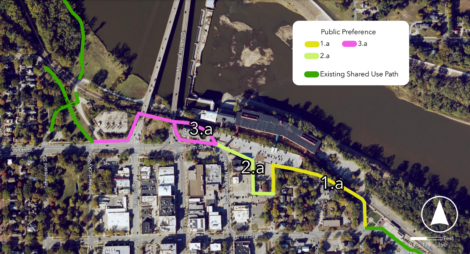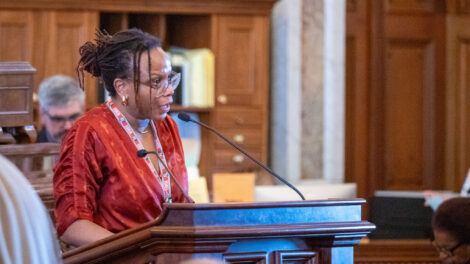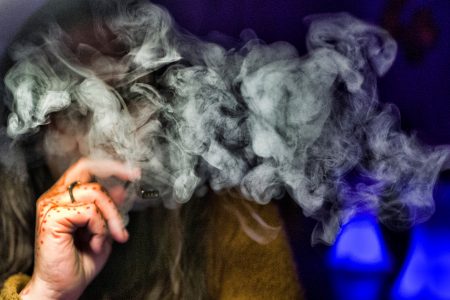Lawrence-Douglas County health department report calls the city a ‘tobacco swamp,’ with high number of shops, sales to underage buyers

photo by: AP Photo/Craig Mitchelldyer
In this photo from April 16, 2019, a researcher holds vape pens in a lab at Portland State University in in Portland, Ore.
Nearly two years after Lawrence city commissioners established the city’s tobacco licensing program, Lawrence has a “glut” of licensed tobacco retailers, almost 20% of which were found to have sold tobacco products to underage customers in 2023.
That’s according to a new report from Lawrence-Douglas County Public Health, which has been studying tobacco sales in the city since the commission approved the city’s tobacco retail licensing program in November 2022.
Among other things, the report, which called Lawrence a “tobacco swamp,” found that the city had 73 licensed tobacco retailers in 2023 — a higher number per capita than neighboring Johnson County. Vicki Collie-Akers, an associate professor in the Department of Population Health at the University of Kansas Medical Center and a representative with LDCPH, said that the number has since risen to 78 this year.
The report identified 14 shops in 2023 that had sold products to people under the age of 21, or 19% of the retailers licensed in that year. Two of those retailers were found to have sold to underage buyers multiple times, and 42% of retailers that sold to underage buyers were within half a mile of a school.
In addition, the report mentioned a survey of 10th and 12th graders in the county in which one in four said they had used e-cigarettes or vapes.
All of this suggests that Lawrence youth have “somewhat easy access to tobacco,” Collie-Akers said. She said that some local retailers were “actively circumventing” the restrictions on sales to underage buyers, including by “brazen” methods such as a clerk scanning their own ID to approve a purchase for an underage buyer.
Traditional tobacco products like cigarettes have generally been on the decline, but Collie-Akers said newer products like vapes are still popular and that there is still work to be done to reduce young people’s access to them.
“I think there’s a perception that the tobacco problem is so much better and resolved,” Collie-Akers said.
On the federal level, the legal age for purchasing tobacco was changed from 18 to 21 in 2019, and Lawrence and Kansas would change their own rules a few years later: Lawrence in November 2022 and Kansas in July 2023. Lawrence’s change came at the same time as its adoption of the new retail licensing policy, which was the third of its kind in the state.
The policy tasks the health department with licensing all retailers that sell tobacco products, including vaping or e-cigarettes and related paraphernalia; conducting compliance checks twice a year to monitor the sales of tobacco products to people under 21; and issuing citations for retailers that sell tobacco to underage buyers. Collie-Akers said the ability to do compliance checks on a local level was important because state-level enforcement efforts can be hampered by a lack of resources.
Moving forward, the department is working with city officials and talking about preventing new licenses from being issued to retailers within half a mile of a school. Although there is nothing concrete on the table yet, Collie-Akers was hopeful that some action could be taken to curb the rise in new tobacco retailers.
“I think it’s important to be thoughtful about how and under what conditions that growth should occur,” Collie-Akers said.







